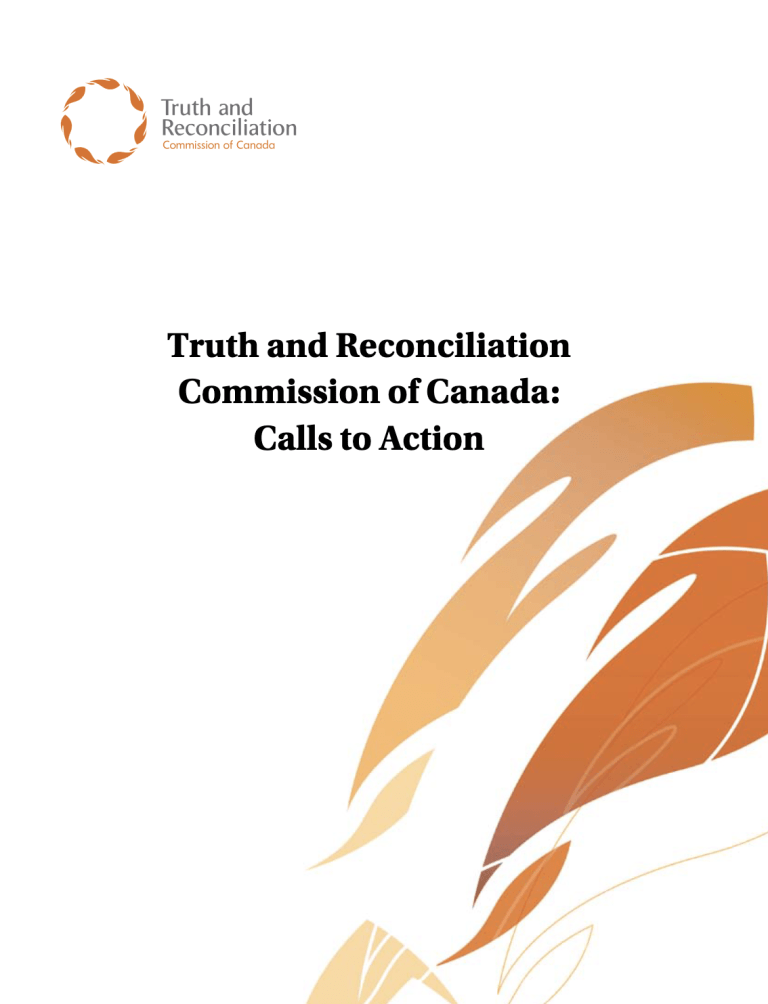59 search results
for
Public education and reconciliation
Reconciliation
Missing children and burial information
Recommendation 76: We call upon the parties engaged in the work of documenting, maintaining, commemorating, and protecting residential school cemeteries to adopt strategies in accordance with the following principles:- The Aboriginal community most affected shall lead the development of such strategies.
- Information shall be sought from residential school Survivors and other Knowledge Keepers in the development of such strategies.
- Aboriginal protocols shall be respected before any potentially invasive technical inspection and investigation of a cemetery site.
-
Category and theme:
Groups affected:
Location of recommendation:
Reconciliation
National Centre for Truth and Reconciliation
Recommendation 77: We call upon provincial, territorial, municipal, and community archives to work collaboratively with the National Centre for Truth and Reconciliation to identify and collect copies of all records relevant to the history and legacy of the residential school system, and to provide these to the National Centre for Truth and Reconciliation.-
Category and theme:
Audience:
Groups affected:
Location of recommendation:
Reconciliation
National Centre for Truth and Reconciliation
Recommendation 78: We call upon the Government of Canada to commit to making a funding contribution of $10 million over seven years to the National Centre for Truth and Reconciliation, plus an additional amount to assist communities to research and produce histories of their own residential school experience and their involvement in truth, healing, and reconciliation.-
Category and theme:
Audience:
Groups affected:
Location of recommendation:
Reconciliation
Commemoration
Recommendation 79: We call upon the federal government, in collaboration with Survivors, Aboriginal organizations, and the arts community, to develop a reconciliation framework for Canadian heritage and commemoration. This would include, but not be limited to:- Amending the Historic Sites and Monuments Act to include First Nations, Inuit, and Métis representation on the Historic Sites and Monuments Board of Canada and its Secretariat.
- Revising the policies, criteria, and practices of the National Program of Historical Commemoration to integrate Indigenous history, heritage values, and memory practices into Canada’s national heritage and history.
- Developing and implementing a national heritage plan and strategy for commemorating residential school sites, the history and legacy of residential schools, and the contributions of Aboriginal peoples to Canada’s history.
-
Category and theme:
Groups affected:
Location of recommendation:
Reconciliation
Commemoration
Recommendation 80: We call upon the federal government, in collaboration with Aboriginal peoples, to establish, as a statutory holiday, a National Day for Truth and Reconciliation to honour Survivors, their families, and communities, and ensure that public commemoration of the history and legacy of residential schools remains a vital component of the reconciliation process.-
Category and theme:
Audience:
Groups affected:
Location of recommendation:
Reconciliation
Commemoration
Recommendation 81: We call upon the federal government, in collaboration with Survivors and their organizations, and other parties to the Settlement Agreement, to commission and install a publicly accessible, highly visible, Residential Schools National Monument in the city of Ottawa to honour Survivors and all the children who were lost to their families and communities.-
Category and theme:
Audience:
Groups affected:
Location of recommendation:
Reconciliation
Commemoration
Recommendation 82: We call upon provincial and territorial governments, in collaboration with Survivors and their organizations, and other parties to the Settlement Agreement, to commission and install a publicly accessible, highly visible, Residential Schools Monument in each capital city to honour Survivors and all the children who were lost to their families and communities.-
Category and theme:
Audience:
Groups affected:
Location of recommendation:
Reconciliation
Commemoration
Recommendation 83: We call upon the Canada Council for the Arts to establish, as a funding priority, a strategy for Indigenous and non-Indigenous artists to undertake collaborative projects and produce works that contribute to the reconciliation process.-
Category and theme:
Audience:
Groups affected:
Location of recommendation:
Reconciliation
Media and reconciliation
Recommendation 84: We call upon the federal government to restore and increase funding to the CBC/Radio-Canada, to enable Canada’s national public broadcaster to support reconciliation, and be properly reflective of the diverse cultures, languages, and perspectives of Aboriginal peoples, including, but not limited to:- Increasing Aboriginal programming, including Aboriginal-language speakers.
- Increasing equitable access for Aboriginal peoples to jobs, leadership positions, and professional development opportunities within the organization.
- Continuing to provide dedicated news coverage and online public information resources on issues of concern to Aboriginal peoples and all Canadians, including the history and legacy of residential schools and the reconciliation process.
-
Category and theme:
Audience:
Groups affected:
Location of recommendation:
Reconciliation
Media and reconciliation
Recommendation 85: We call upon the Aboriginal Peoples Television Network, as an independent non-profit broadcaster with programming by, for, and about Aboriginal peoples, to support reconciliation, including but not limited to:- Continuing to provide leadership in programming and organizational culture that reflects the diverse cultures, languages, and perspectives of Aboriginal peoples.
- Continuing to develop media initiatives that inform and educate the Canadian public, and connect Aboriginal and non-Aboriginal Canadians.
-
Category and theme:
Groups affected:
Location of recommendation:
